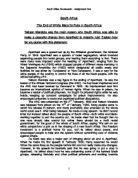Nelson Mandela, born 1918, was a South African black man who studied law and fought against apartheid.
Earlier in his life, Mandela protested against segregation using peaceful methods. For example, he became a ‘volunteer in chief’ for the ANC, a group which tried to get the rights for non-whites. As this position, he was important in the Defiance Campaign of 1952, which used passive methods of resistance by only ignoring the rules of the white government. Also, he set up the first black law firm in Johannesburg, where he ran away to, which helped him speak out against the white rules. This scared the officials because Mandela is a black man who was not afraid to speak out, therefore banned him leaving Johannesburg. In secret, Mandela worked for the ANC and participated in the Freedom Charter of 1955 which wanted basic rights for non-whites.
However, Mandela was found to have been involved in the planning of a sabotage after joining the MK, when the ANC became an underground organisation to take a more violent approach. This was trying to get rid of apartheid too, but it was not carried out. He was found guilty and was almost certain to be executed, but spoke out again in court and was sent to prison for 28 years.
Considering that 28 years is a long time to say isolated from the world, therefore not being able to play much of a role in the ending of apartheid at this point, as he was not allowed to be quoted by newspapers for the fear of him encouraging others, you have to look at other factors to do with integration while he was there to see if they had a role too.
In the 1950s and 60s, black governments were starting to replace white rule in some colonies in Africa. For example Sudan gained independence in 1956 and Zaire in 1960. This independence was caused by African Nationalism, which was when African countries started ruling themselves.
One thing that happened because of African Nationalism was the Sharpeville Massacre. This was when blacks from the African National Congress and Pan African Congress went to a peaceful protest in Sharpeville to demand a change in the Pass Law. But unfortunately the police there panicked and shot at the crowd from behind killing many, and this also shocked countries such as the USA, Britain and France. This meant they would be able to give support, helping to end apartheid.
Other countries also started to get involved in what was happening in South Africa because of African Nationalism. For example, Macmillan, the British Prime Minister of that time, did not like Apartheid and made a speech on how it should be abolished. In it he said, ‘…the aim is to create a society which respects the rights of the individuals’, which criticises the SA government as it talks about blacks having equal rights. This was important as it started to get other countries involved and recognising the problem there. This would have put pressure on the government to abolish it.
Also, pressure from the UN, the OAU and the Lusaka Conference was large for SA. The UN was a big country and every African nation wanted to be a part of it to help end apartheid. In the Lusaka Conference, the points were about racism, and how it should be condemned. This pressurised SA because it was a big organisation who were speaking out and could defy the SA government.
African Nationalism was an important factor, as it gained support from other countries and helped replace white governments, and these helped to end apartheid. However, Mandela also tried to get other countries to recognise what was going on when he snuck out and also spoke out and gained support when he took part in things like the Defiance Campaign and the Freedom Charter, so in this case, I think Mandela was more important in ending apartheid.








